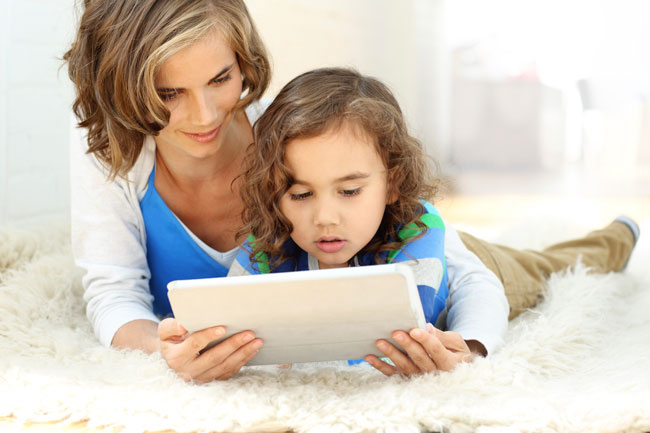On June 26-27, McGill will host the Digital Literacy for Preschoolers Conference, focusing on how adults use eBooks for shared reading with children and whether children learn language and reading skills when using digital devices. In recent years the number of young children using mobile devices has doubled and the amount of time that young children spend with these devices has tripled. Parents and teachers have many questions about when, if and how best to use digital media with children.
At the conference, new research in this emerging field will help answer questions about the best use of digital media at home and school. There will be scientific presentations from leading researchers on the first day and round table discussions among diverse participants on the second day. In advance of the conference, the McGill reporter spoke to Susan Rvachew, a speech pathologist and a professor in the School of Communication Sciences and Disorders, about the benefits of eBooks as a teaching tool.
Parents hear it all the time. Too much screen time – be it in front of the television, a computer or a video game monitor – will rot your child’s brain. The headlines warn us about the evils of screens; blaming them for everything from obesity, insomnia and social difficulties, to increased levels of depression, anxiety and learning difficulties among our children.
But Susan Rvachew, a speech pathologist and a professor in the School of Communication Sciences and Disorders, says not all screen-based technologies are created equal. Some, she says, can be a boon to a child’s reading and language development.

“There is a ton of potential in tablets and the best eBooks for children are wonderful teaching tools,” says Rvachew. “But in order for them to be really effective, they have to be well designed and they should involve active participation of a parent or other adult that goes beyond just reading words on the screen.”
Unlike traditional story time in which the adult reads while the child listens, good quality eBooks demand active engagement from everyone involved. Pages should include items such as animations that support the story and pull a child into the story as an active participant, prompts that cue adults when to ask specific questions and various touch-screen buttons that will help a child link the words on the screen to the actual story.
In particular, the latter is useful in helping children learn how to read. “One thing we know about children and print books is that until they are taught how to read they completely ignore the words on the page,” says Rvachew. “They may memorize the story and how it relates to the picture, but not the printed word… One of the advantages of a well-constructed eBook is that helps children notice the words and learn the relationship between the printed word and story.”
Rvachew says that the best eBooks can draw a child into a story very effectively because that child is actively engaged, clicking buttons, activating related animations and answering questions. The quality of this engagement makes for a profound learning opportunity.
Learning their ABCs by rote has its place in the classroom, says Rvachew, but those early lessons have a deeper impact when the child is pushed beyond basic memorization. “It is always better to have books that have a story a child can relate to,” she says. “Meaningful learning sticks with us forever.”
Rvachew wants to ease parents’ apprehension regarding eBooks by saying comparing them to computer games and television shows is an apples and oranges proposition. While many parents complain that screens are turning their children into antisocial zombies, eBooks on tablets can have the opposite effect because, above all else, they demand interaction. “In one of our studies we asked community volunteers to read print books and eBooks to kindergarten children. We heard more discussions, more give and take between adult and child when reading the eBook than with the print books,” she says, “eBooks can lead to more teaching and learning opportunities when they are designed well and the adult is actively engaged with the child.”
Rvachew laughs that adults sometimes have problems giving up control of an eBook when the child wants to click a button. “We’re used to the traditional top-down structure where the adult reads and the children sit quietly and listen. The adult has all the power,” she says. “But that doesn’t really work with eBooks because they have animations and things to click. The child thinks they are toys, the parent thinks they are books. Sometimes they get into little arguments over who is supposed to control it.”
But a lot of bells and whistles is not necessarily a great thing. “Animations are great, but they can be distracting,” she says. “Every aspect of an eBook should support the story, not distract from it.”
And before parents (and printers) begin to flood Rvachew’s In Box with angry emails, they should know that she is not advocating replacing print books with eBooks. Both, she says, can live in complimentary harmony.
“There should always be a place for reading print books to your children,” she says. “There are less distractions in print books and bedtime readings are really wonderful moments between parent and child. Because eBooks are so engaging, they don’t necessarily have that same calming effect that print books have.
“In the end, any opportunity an adult has to share quality time with their child is beneficial for everyone.”
Learn more about the Digital Literacy for Preschoolers Conference (June 26-27).

